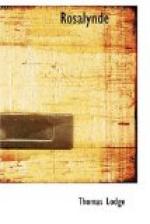Devoid of rest, companion
of distress,
Plague to myself, consumed
by my thought,
How may my voice or pipe in
tune be brought,
Since I am reft of solace
and delight?
CORYDON
Ah, lorrel lad, what makes
thee hery[1] love?
A sugared harm, a poison full
of pleasure,
A painted shrine full filled
with rotten treasure;
A heaven in show, a hell to
them that prove.[2]
A gain in seeming, shadowed
still with want,
A broken staff which folly
doth uphold,
A flower that fades with every
frosty cold,
An orient rose sprung from
a withered plant.
A minute’s joy to gain
a world of grief,
A subtle net to snare the
idle mind,
A seeing scorpion, yet in
seeming blind,
A poor rejoice, a plague without
relief.
Forthy,[3] Montanus, follow
mine arede,[4]
(Whom age hath taught the
trains[5] that fancy useth)
Leave foolish love, for beauty
wit abuseth,
And drowns, by folly, virtue’s
springing seed.
[Footnote 1: praise.]
[Footnote 2: try, test.]
[Footnote 3: hence.]
[Footnote 4: advice.]
[Footnote 5: stratagems.]
MONTANUS
So blames the child the flame
because it burns,
And bird the snare because
it doth entrap,
And fools true love because
of sorry hap,
And sailors curse the ship
that overturns.
But would the child forbear
to play with flame,
And birds beware to trust
the fowler’s gin,
And fools foresee before they
fall and sin,
And masters guide their ships
in better frame;
The child would praise the
fire because it warms,
And birds rejoice to see the
fowler fail,
And fools prevent before their
plagues prevail,
And sailors bless the barque
that saves from harms.
Ah, Corydon, though many be
thy years,
And crooked elde[1] hath some
experience left,
Yet is thy mind of judgment
quite bereft,
In view of love, whose power
in me appears.
The ploughman little wots
to turn the pen,
Or bookman skills to guide
the ploughman’s cart;
Nor can the cobbler count
the terms of art,
Nor base men judge the thoughts
of mighty men.
Nor withered age, unmeet for
beauty’s guide,
Uncapable of love’s
impression,
Discourse of that whose choice
possession
May never to so base a man
be tied.
But I, whom nature makes of
tender mould,
And youth most pliant yields
to fancy’s fire,
Do build my haven and heaven
on sweet desire,
On sweet desire, more dear
to me than gold.
Think I of love, oh, how my
lines aspire!
How haste the Muses to embrace
my brows,
And hem my temples in with
laurel boughs,
And fill my brains with chaste
and holy fire!




